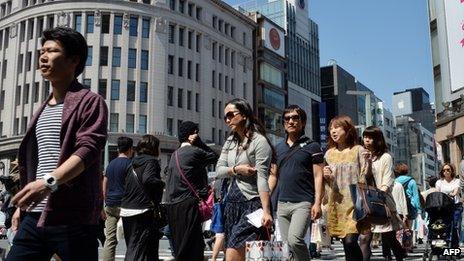Japan wage growth surges in July
- Published

Japanese wages unexpectedly logged their strongest increase since 1997, providing a boost to the government's battle against deflation.
Labour cash earnings rose by 2.6% in July compared to a year ago, beating forecasts of a slowdown to 0.9%.
Special payments, or summer bonuses, grew by an annual 7.1% in July from a revised 2% gain in June.
However, some economists warn that wage growth is set to slow in coming months.
"The summer bonus season ends in August, and bonus payments are set to fall sharply. As a result, the growth rate of overall earnings will mostly be driven by changes in regular pay," Marcel Theliant from Capital Economics said.
"With base pay expanding clearly less rapidly than bonuses, wage growth will likely slow again in coming months, but it should stay in positive territory."
The data suggest that some firms are raising wages, which is crucial to improving Japan's overall economic performance.
Japan has struggled to break out of nearly two decades of falling prices, or deflation, which has resulted in stagnant economic growth.
To combat this, the government undertook a massive stimulus plan aimed at weakening the currency and spurring spending. It hopes to achieve a 2% rate of inflation next year.
However, an April sales tax hike - needed to raise funds to address the fiscal deficit - caused a drag on Japan's economy because it became more expensive for people to spend.
Asia's second-largest economy shrank by an annualised 6.8% in the second quarter after household spending plummeted.
Japanese Prime Minister Shinzo Abe is also considering the implementation of a second tax hike in October next year.
- Published29 August 2014
- Published20 August 2014
- Published13 August 2014